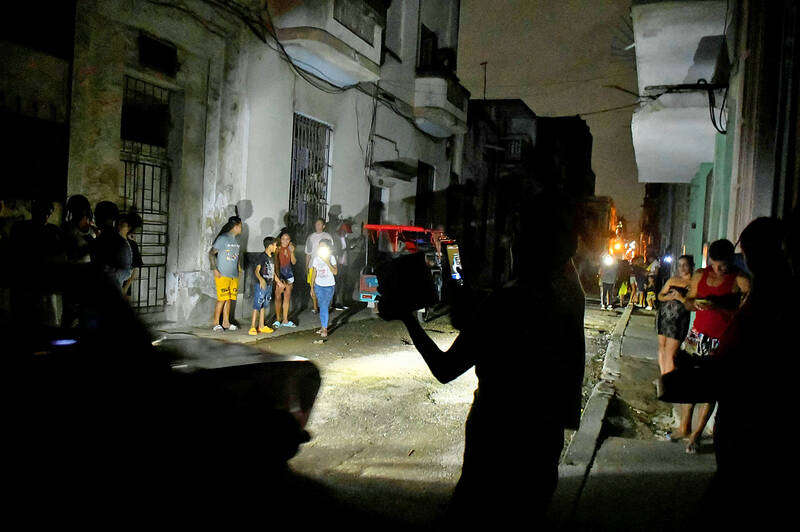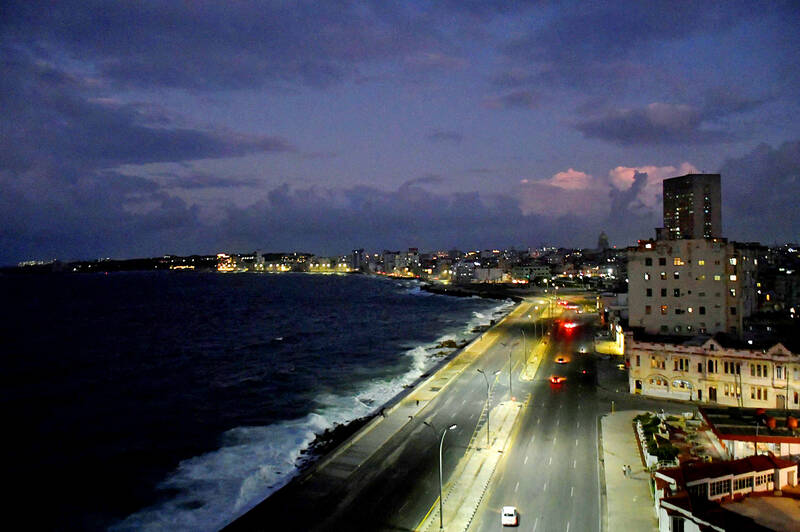Maria Elena Cardenas, 76, lives in a municipal shelter on Amargura Street in Havana’s colonial old town.
The building has an elegant past, but for the last few days Maria has been cooking with sticks she had found on the street.
“You know, we Cubans manage the best we can,” she said.

Photo: REUTERS
She lives in the shelter because her home collapsed, a regular occurrence in the poorest, oldest parts of the beautiful city.
Cuba’s government has spent the last days attempting to get the island’s national grid functioning after repeated island-wide blackouts. Without power, sleep becomes difficult in the heat, food spoils and the water supply fails.
Parts of Cuba’s communist system still function: the municipality sent Maria food. “We are three families here,” she said. “I live alone, the lady who lives next to me [does] also, and there are two children, the children’s mother, her aunt and an elderly man.”

Photo: Reuters
A week after the blackout, the island has returned to the status quo ante with regular power cuts of up to 20 hours a day, but the crisis has left a deep, melancholy dread about the future.
This crisis began on Oct. 17, when an order went out for all non-essential state workers to go home.
The effort to save power did not save the system, and a day later, the island went dark. Antonio Guiteras, one of the main power stations, shut down, crashing all the other big generating stations in the system.
“It’s very hard to restart a power station,” said a retired engineer from Antonio Guiteras, who asked to remain anonymous. “You need to produce a lot of electricity just to get it going.”
Antonio Guiteras was built in 1989, and is now battered and obsolete. “The truth is that it was built rotten,” the engineer said. He told harrowing stories of working with faulty safety equipment, political management who would disappear when problems arose and a system long pushed to its limit.
The government acknowledges the parlous state of its system, blaming the 62-year old-trade embargo imposed by the US.
“Financial and energy persecution” made it difficult to “import fuel and other resources necessary,” Cuban President Miguel Diaz-Canel said.
For most of its existence, Cuba’s government has relied on the largesse of allies — first the Soviet Union, then Russia and Venezuela.
However, those countries, facing their own difficulties, have cut supplies heavily. “It’s like trying to keep a sinking ship afloat with corks,” one European diplomat said.
In a televised address, Cuban Prime Minister Manuel Marrero said the emerging private sector would have to pay more for its power, while the government looks to renewables to secure its energy needs.
The island has a lot of sunshine, but the multiple attempts to start solar projects have nearly all failed when the companies involved failed to get paid.
Instead, a deal has been cut with a Chinese firm to provide the materials for a slew of solar farms in return for access to Cuba’s nickel deposits, but with more than 10 percent of Cuba’s population having fled the economic crisis on the island in the past two years, there is skepticism whether the expertise remains to build such systems.
US President Joe Biden has said that while he is “tough” on the Cuban government, he supports the Cuban people.
However, Washington could do much more to help Cuba, said US academic William LeoGrande in the latest issue of Foreign Policy magazine.
“The proponents of regime change should be careful what they wish for,” he wrote. “A collapse of the regime would be a humanitarian disaster, spurring an emigration tsunami far larger than what we have seen so far.”
Unlike during previous power cuts, there has been very little protest this time, beyond the bashing of some pots and pans. People seem exhausted and government ministers have made it clear that the government would come down hard on any “indecent” behavior.
Dariel Ramirez was sitting on his stoop in the old town. He did not have much to eat because he had shared his stored food with others before it spoiled.
Asked how he was preparing for any repeat of the power crisis, he pointed toward the Museum of the Revolution, where the central symbol of communist rule is displayed: the boat on which revolutionaries and former Cuban presidents Fidel and Raul Castro arrived from Mexico in 1956.
“If this happens again, we need to prepare the Granma yacht,” he said. “So we can all sail away.”

FRAUD ALLEGED: The leader of an opposition alliance made allegations of electoral irregularities and called for a protest in Tirana as European leaders are to meet Albanian Prime Minister Edi Rama’s Socialist Party scored a large victory in parliamentary elections, securing him his fourth term, official results showed late on Tuesday. The Socialist Party won 52.1 percent of the vote on Sunday compared with 34.2 percent for an alliance of opposition parties led by his main rival Sali Berisha, according to results released by the Albanian Central Election Commission. Diaspora votes have yet to be counted, but according to initial results, Rama was also leading there. According to projections, the Socialist Party could have more lawmakers than in 2021 elections. At the time, it won 74 seats in the

A Croatian town has come up with a novel solution to solve the issue of working parents when there are no public childcare spaces available: pay grandparents to do it. Samobor, near the capital, Zagreb, has become the first in the country to run a “Grandmother-Grandfather Service,” which pays 360 euros (US$400) a month per child. The scheme allows grandparents to top up their pension, but the authorities also hope it will boost family ties and tackle social isolation as the population ages. “The benefits are multiple,” Samobor Mayor Petra Skrobot told reporters. “Pensions are rather low and for parents it is sometimes

CANCER: Jose Mujica earned the moniker ‘world’s poorest president’ for giving away much of his salary and living a simple life on his farm, with his wife and dog Tributes poured in on Tuesday from across Latin America following the death of former Uruguayan president Jose “Pepe” Mujica, an ex-guerrilla fighter revered by the left for his humility and progressive politics. He was 89. Mujica, who spent a dozen years behind bars for revolutionary activity, lost his battle against cancer after announcing in January that the disease had spread and he would stop treatment. “With deep sorrow, we announce the passing of our comrade Pepe Mujica. President, activist, guide and leader. We will miss you greatly, old friend,” Uruguayan President Yamandu Orsi wrote on X. “Pepe, eternal,” a cyclist shouted out minutes later,

CONTROVERSY: During the performance of Israel’s entrant Yuval Raphael’s song ‘New Day Will Rise,’ loud whistles were heard and two people tried to get on stage Austria’s JJ yesterday won the Eurovision Song Contest, with his operatic song Wasted Love triumphing at the world’s biggest live music television event. After votes from national juries around Europe and viewers from across the continent and beyond, JJ gave Austria its first victory since bearded drag performer Conchita Wurst’s 2014 triumph. After the nail-biting drama as the votes were revealed running into yesterday morning, Austria finished with 436 points, ahead of Israel — whose participation drew protests — on 357 and Estonia on 356. “Thank you to you, Europe, for making my dreams come true,” 24-year-old countertenor JJ, whose